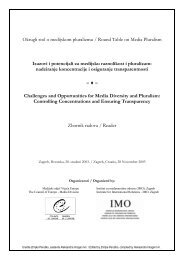almanac on security sector oversight in the Western Balkans
almanac on security sector oversight in the Western Balkans
almanac on security sector oversight in the Western Balkans
You also want an ePaper? Increase the reach of your titles
YUMPU automatically turns print PDFs into web optimized ePapers that Google loves.
number of research methods and a resource-<strong>in</strong>tensive research design, mix<strong>in</strong>g different<br />
methods, were essential for ensur<strong>in</strong>g accurate and useful research outputs. It also<br />
accommodated variati<strong>on</strong>s <strong>in</strong> <strong>the</strong> <strong>in</strong>stituti<strong>on</strong>al designs and political c<strong>on</strong>texts studied.<br />
10 . Validati<strong>on</strong> of research <strong>in</strong>strument and f<strong>in</strong>d<strong>in</strong>gs<br />
The validity of research f<strong>in</strong>d<strong>in</strong>gs was improved through focus groups (expert c<strong>on</strong>sultati<strong>on</strong>s)<br />
with representatives of government agencies and journalists. Moreover, all<br />
papers were reviewed by BCSP and DCAF experts, as well as peer reviewed <strong>in</strong> a series<br />
of n<strong>in</strong>e workshops organized dur<strong>in</strong>g <strong>the</strong> project cycle.<br />
At <strong>the</strong> workshops, researchers were given <strong>the</strong> opportunity to review papers and<br />
grades from o<strong>the</strong>r organisati<strong>on</strong>s, usually <strong>in</strong> mixed teams. A special sessi<strong>on</strong> was organized<br />
<strong>in</strong> <strong>the</strong> last workshop for a f<strong>in</strong>al review of grades, some of which are <strong>in</strong>cluded <strong>in</strong><br />
this publicati<strong>on</strong>.<br />
11 . Measur<strong>in</strong>g <strong>oversight</strong> from <strong>the</strong> perspective of a CSO<br />
A major <strong>in</strong>novati<strong>on</strong> of <strong>the</strong> methodology was that it was <strong>in</strong>itiated by a CSO for use<br />
by o<strong>the</strong>r civil society organisati<strong>on</strong>s, with <strong>the</strong> aim of streng<strong>the</strong>n<strong>in</strong>g nati<strong>on</strong>ally driven<br />
assessments and local ownership of <strong>security</strong> <strong>sector</strong> reform. The majority of methods<br />
and <strong>in</strong>struments used to assess SSR are devised to suit d<strong>on</strong>or needs and <strong>in</strong>terests. This<br />
applies equally to <strong>in</strong>dividual d<strong>on</strong>or countries 228 and <strong>in</strong>ternati<strong>on</strong>al organisati<strong>on</strong>s which<br />
endorse reforms <strong>in</strong> candidate countries seek<strong>in</strong>g membership (NATO, EU) or organisati<strong>on</strong>s<br />
encourag<strong>in</strong>g reforms <strong>in</strong> <strong>the</strong>ir own member countries (OSCE, UN). 229 This could<br />
expla<strong>in</strong>, at least <strong>in</strong> part, why n<strong>on</strong>e of <strong>the</strong>se organisati<strong>on</strong>s has developed a holistic/<br />
comprehensive approach to measur<strong>in</strong>g progress <strong>in</strong> SSR; or more precisely, why <strong>the</strong>y<br />
<strong>on</strong>ly draw <strong>the</strong>ir beneficiaries’ attenti<strong>on</strong> to certa<strong>in</strong> aspects of SSR. So far, <strong>the</strong> OECD<br />
(2007) is <strong>the</strong> <strong>on</strong>ly organisati<strong>on</strong> which has developed a comprehensive approach, <strong>in</strong><br />
<strong>the</strong>ir Handbook <strong>on</strong> Security Sector Reform, 230 which c<strong>on</strong>ta<strong>in</strong>s guidel<strong>in</strong>es and <strong>in</strong>struments<br />
for programm<strong>in</strong>g and implementati<strong>on</strong> of a holistic approach to SSR and for<br />
measur<strong>in</strong>g its progress. However, this is primarily <strong>in</strong>tended for d<strong>on</strong>or countries that<br />
are members of <strong>the</strong> OECD Development Assistance Committee (DAC). 231<br />
228 A majority of c<strong>on</strong>ceptual texts <strong>on</strong> SSR were developed <strong>in</strong> <strong>the</strong> UK and <strong>the</strong> Ne<strong>the</strong>rlands. For key<br />
sources see: Rynn and Hiscock (2009); and Rynn (2009).<br />
229 For a detailed list of standards and models for SSR promoted by different <strong>in</strong>ternati<strong>on</strong>al organisati<strong>on</strong>s,<br />
see: Law, D. (ed.) (2007) Intergovernmental organisati<strong>on</strong>s and <strong>security</strong> <strong>sector</strong> reform (DCAF) or for<br />
<strong>the</strong> sec<strong>on</strong>d generati<strong>on</strong> literature: Sedra, Mark (2010) The Future of SSR (Ontario: CIGI).<br />
230 OECD-DAC Handbook <strong>on</strong> Security System Reform (SSR): Support<strong>in</strong>g Security and Justice (2007)<br />
available at: www.oecd.org/dac/c<strong>on</strong>flict/if-ssr.<br />
231 DAC-Development Assistance Committee is <strong>the</strong> ma<strong>in</strong> body with<strong>in</strong> which OECD member countries<br />
def<strong>in</strong>e and m<strong>on</strong>itor global standards <strong>in</strong> key areas of development and co-ord<strong>in</strong>ate <strong>the</strong>ir development<br />
assistance (www.oecd.org/dac).<br />
260



